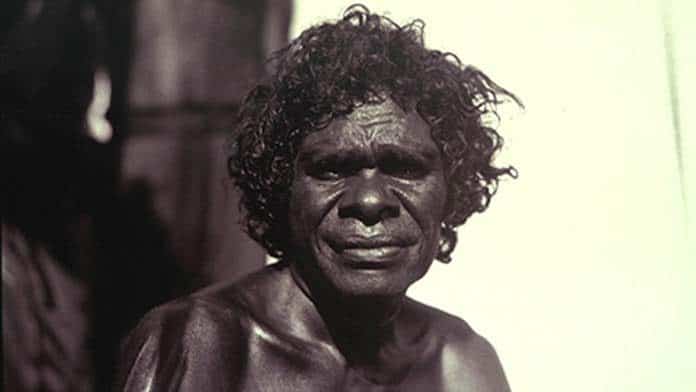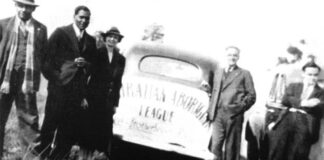Paddy Gibson explains the key role unions and the Communist Party played in preventing the punitive expedition planned in Arnhem Land in 1933
On 1 August 1933, Yolngu leader Dhakiyarr Wirrpanda fatally speared a NT police officer. Constable McColl was on Dhakiyarr’s land on Woodah Island in East Arnhem Land, investigating the killing of Japanese trepang fisherman. McColl was holding four Yolngu women in chains at the time, trying to force them to help his investigation. They included Dhakiyarr’s wife Djaparri Wirrpanda.
At the most senior levels of government, sending police out to massacre Aboriginal people and force submission to Australian law was still considered a necessary response to events like the spearing of McColl. A government inquiry had exonerated police responsible for killing scores of Aboriginal people in a massacre at Coniston in Central Australia in 1928. Now, both the NT Administration and the Department of the Interior in Canberra began to prepare a “punitive expedition” that would ride into Arnhem Land and “teach the natives a lesson”.
This planned massacre never took place. Dhakiyarr’s act of resistance inspired an unprecedented movement of support for Aboriginal rights across broad sections of Australian society. Crucially, socialists in the Communist Party of Australia (CPA) drove a campaign through trade unions and the Unemployed Workers’ Movement that raised the threat of collective workers’ action in solidarity with Aboriginal people.
The government was forced into a humiliating back down. This was the last attempt at a police massacre of Aboriginal people in Australian history.
Massacre plans
From the late 19th Century, Australian pastoral capitalism and mineral prospectors began to push into Yolngu homelands, bringing with them a genocidal model of settler-colonialism. The Yolngu had traded with Macassans and other ships sailing from Asia to harvest trepang (sea cucumber) for centuries. Where other foreigners had sought exchange, the white Australians sought to conquer and exterminate.
In 1931, missionaries succeeded in having Arnhem Land gazetted as an Aboriginal reserve they would manage. But trepang expeditions by both Australian and Japanese ships continued. Several crews were killed by Yolngu war parties in this period, after conflicts over payment of wages and sexual abuse. Police also continued to conduct murderous patrols into the 1930s.
NT police seized on the killing of Constable McColl, immediately taking the initiative to prepare a war party. A telegram from the NT Administrator Robert Weddell to his superiors in Canberra on 27 August outlined the plan:
Strong demonstrative force imperative as natives numerous, hostile and cunning… will be civilians experienced bushman sworn in as special constables… propose arming party with twenty rifles and 2000 rounds of ammunition, twelve revolvers and 1000 rounds of ammunition and four shot guns and 300 cartridges. Please obtain and forward by Marella [a ship] without fail twelve .450 revolvers and 1000 rounds of revolver ammunition, twelve bandoliers also two pairs of best field glasses… in view of past experience consider casualties amongst these Aboriginals inevitable
In his own correspondence with the Interior Ministry, Constable Morey was also explicit about the need for brutal violence:
[Caledon Bay natives] have an abundance of confidence in themselves and have not, to our knowledge, yet been beaten… Whose blood will stain Arnhem Land, whether black or white, or both, only the future will tell. It will be vitally necessary for the Police Party to be able to bear losses and casualties and yet be numerically adequate to carry on the operation to its finalisation.
The Interior Ministry organised to ship the requested guns and ammunition to Darwin. There was also strong, initial enthusiasm for reprisals from Interior Minister John Perkins, who told the press he would back Weddell’s proposal in an upcoming Cabinet meeting and was confident of winning support. NT pastoralists were calling for blood and there was widespread public support in Darwin for a massacre to avenge McColl.
But one section of Darwin society was opposed. The radical workers’ movement, particularly unemployed workers organised by the CPA, was constantly battling with police. Police broke up their camps and demonstrations, routinely jailing activists. Eighteen months prior, police fired live ammunition into an old hospital in Pine Creek being squatted by the unemployed.
The multi-racial Unemployed Workers Movement (UWM) fought against the North Australian Workers Union policy of restricting membership to whites.
Many UWM activists, traveling in the Depression looking for work, had made friends with Aboriginal people still living off their lands, including around Caledon Bay. Throughout August, the UWM Northern Voice carried articles expressing admiration for the the Yolngu, “aboriginals who had sufficient courage to pit their spears against the 303s of the police, rather than submit to the white man’s domination… people are entitled to protect themselves from injustice and oppression”.
Calling for action against the planned raid, Northern Voice drew on radical, anti-imperialist traditions within the Australian labour movement. During the First World War, the Industrial Workers of the World had run large scale campaigns urging workers not to enlist. Now, a similar appeal was made to disrupt recruitment for the threatened war party:
We call upon all workers and all people who believe in fair play not only to refuse to enlist should volunteers be called for, but to actively endeavour to persuade others to refuse and to put every possible obstacle in the way of the authorities in order that we may not have another butchering expedition.
The article announced the formation of a “provisional committee” to “conduct a campaign against the proposed expedition”. Its most important work was sending telegrams and letters to southern cities, alerting potential allies to the massacre plans and calling for solidarity action.
“We consider this an act of war”
Since its formation in 1921, the CPA had opposed racism and supported self-determination for colonised peoples, in line with the anti-imperialist policy of the Communist International. The party fought against the “White Australia” ideology of the mainstream unions and supported national liberation movements worldwide. However it largely ignored Aboriginal struggle in Australia, occasionally condemning brutal conditions, but accepting the idea that Aboriginal people were a “dying race”.
This began to change in the Depression. Across the country, unemployed whites lived side by side with black people in squalid fringe camps. Unemployed Aboriginal workers joined unemployed workers’ meetings in NSW and Queensland, putting forward their own demands for equal pay and an end to racist Protection laws. The CPA published a comprehensive pro-Aboriginal platform in 1931, denouncing continuing genocide through frontier massacres and child removal and demanding freedom, equality and self-determination.
The CPA’s politics were compromised by their uncritical support for Stalin’s dictatorship in Russia. But by the early 1930s they had built significant influence in the union movement, and held the leadership of both the UWM and the growing Councils Against War.
They used this support to mobilise against the proposed massacre. Most existing histories credit missionaries and upper class humanitarians for the lobbying effort that stopped the “punitive expedition”. But more than half of the approximately 70 resolutions of protest sent to Minister Perkins in late August through September came from workers’ organisations—including Victorian Trades Hall and the NSW Labor Council. The CPA agitated for large meetings of protest that raised the threat of escalating action unless demands were met.
The missionaries still wanted to find ways to arrest the killers of McColl and the Japanese. But organisations influenced by the CPA opposed any foray into Arnhem Land on an anti-imperialist basis. On 6 September, the Punchbowl Unemployed and Distress Association wrote to Perkins that a members’ meeting the previous night had condemned the planned expedition, insisting the killing of McColl was justified as the “natives… were defending what was rightfully theirs”.
On 7 September the NSW Council Against War, with an executive that included representatives from major trade unions and Labor Party branches, resolved, “we consider this expedition to be a war against the Aborigines and accordingly demand the project be dropped”.
The government began to soften its stance. Prime Minister Joseph Lyons told the press that “the intentions of the Ministry have apparently been misunderstood” and claimed no punitive expedition had ever been planned. Lyons insisted, however, that police must be sent to Caledon Bay to arrest the killers and that a heavily armed party was needed to protect nearby missions. The guns and ammunition were shipped to Darwin on 9 September.
Many church and humanitarian groups were happy that a massacre had been officially ruled out. But the CPA and its allies continued campaigning to stop any armed expedition whatsoever being sent to Arnhem Land. The CAW called a public meeting in Melbourne for 15 September that attracted approximately 500 people and resolved:
This meeting of Citizens strongly protests against the sending of any armed expedition that may be used against the blacks of the Northern Territory, and demands for them complete freedom to control their own affairs without any outside interference, and without encroachment, commercial or governmental, on their reserves.
The Argus reported on a speech to the meeting from Frank Brennan, a former Labor Federal Attorney-General:
Any killing by blacks of members of an armed expedition which might be sent against them would be justifiable homicide, because the tribes would know the expedition would be armed, that it would try to take some of their number as hostages, and was out to teach them a lesson.
In the face of growing opposition, the Lyons government backed down. They compromised to send an unarmed “peace party” led by missionaries to Caledon Bay to try and convince the Yolngu to come to Darwin for negotiations. These missionaries ultimately betrayed the Yolngu, handing Dhakiyarr and others over to the police, who had them tried and sentenced to death. Another mass campaign won Dhakiyarr’s freedom. But he disappeared soon after, most likely murdered by police.
Horrific injustices and violence against Aboriginal people continue to this day. But the 1933 campaign had forced an end to the long period of open frontier warfare that began with Britain’s invasion of Sydney Cove in 1788.
The breakthrough came when a section of the working class movement began to realise that they shared the same class enemy as Aboriginal people facing off against police guns and that common cause could be made against the capitalist system that oppresses and exploits us all.






